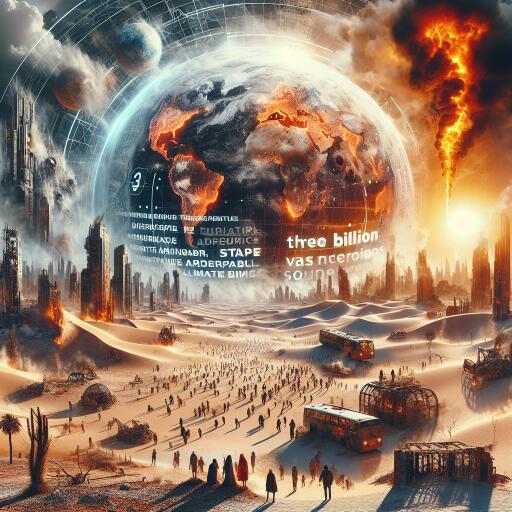
Three billion people will live in uninhabitable zones by 2070
The escalating grip of global warming is setting the stage for a drastic transformation of our planet, with projections indicating that by the year 2070, a staggering three billion individuals might find themselves in the throes of an inhospitable climate. This looming reality suggests a future where vast expanses of the globe morph into terrains as forbidding as the Sahara, rendering them unbearable for human habitation.
Recent findings, unveiled in a comprehensive study published in the Proceedings of the National Academy of Sciences (PNAS) in 2020, bring to light the possibility of nearly 3.5 billion people enduring average temperatures in the mid-80s Fahrenheit. This scenario places a significant portion of humanity outside the ‘comfort zone’ traditionally associated with human life, heralding a host of challenges previously unimaginable.
The geographical impacts of this climatic shift are startling, with projections signaling that regions encompassing northern South America, vast belts across central Africa, wide stretches of India, and parts of northern Australia are on the brink of becoming inhospitable within the next five decades. An acceleration of global warming trends could potentially hasten this transition, prompting an exodus of unprecedented magnitude as individuals seek refuge from the unbearable conditions.
This anticipated migration, driven by the hostile clutches of an overheating planet, represents a movement of people on a scale the world has yet to witness. It is a scenario set to unfold over the coming decades, reshaping populations and communities across the globe.
The specter of climate change is not confined to distant continents. Closer to the world’s traditionally temperate zones, signals of distress are already palpable. Parts of the Mediterranean, including regions within Spain and Italy, are grappling with drought levels that signal a shift towards more extreme conditions. Despite not facing a future of total uninhabitability, these areas are flirting with markedly higher temperatures that promise to strain existing ways of life.
Climatologists, including figures such as Peter Dynes, are ringing alarm bells about the potential for these conditions to deteriorate further. Especially in areas like Europe, there’s a looming crisis of escalating temperatures contributing to increasingly severe drought conditions, heightening the urgency for action as each summer unfolds.
Even as some regions retain their ability to support human life, the cascading effects of climate change are bound to exert substantial economic pressures. The recent upheaval in the olive oil market serves as a poignant example of how climate-induced phenomena such as drought can have far-reaching impacts beyond immediate environmental concerns. This January witnessed a dramatic surge in olive oil prices within the EU, with figures skyrocketing by 50% on a year-on-year basis due primarily to an abysmally low harvest, itself a consequence of prolonged dry spells across the Mediterranean.
Such developments underscore the intricate ways in which climate change can disrupt our lives, spotlighting the pressing need for comprehensive strategies to mitigate its impacts. As we march towards 2070, the implications are clear: vast swaths of our planet may soon lie beyond the threshold of human habitability, demanding an unprecedented collective response to avert a future marked by displacement, hardship, and the relentless march of desertification.





Leave a Reply